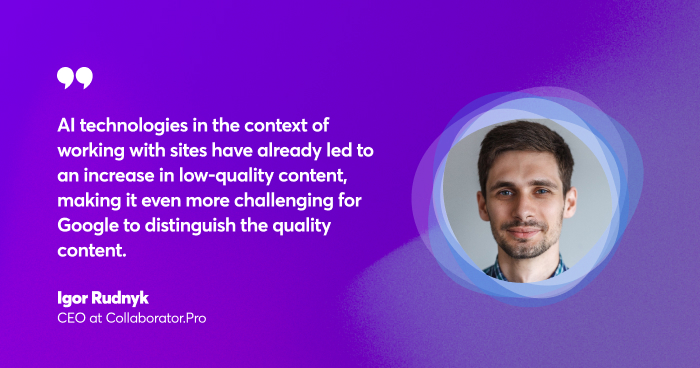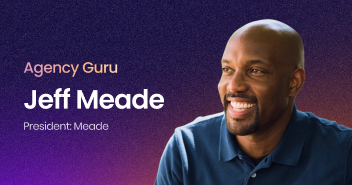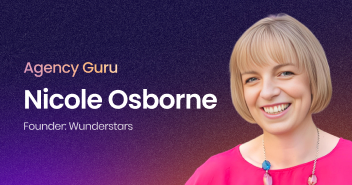
In this interview, Igor Rudnyk, the CEO of Collaborator.Pro, a renowned marketplace for PR publications, shares his wealth of knowledge and expertise on a range of topics, from link building and SEO to marketing.
He takes us on a journey through the evolution of link building, explaining how the focus has shifted from quantity and speed to quality and value. Igor also reveals his favorite link-building techniques, which include creating roundups, offering free tools, and sharing expertise.
As an entrepreneur and CEO, Igor shares his experiences navigating the challenges of starting and growing a business. He provides insight into how he balances short-term results with long-term business goals.
Finally, he shares his insights into content marketing, discussing his approach to integrating it into his SEO and link-building strategies. He shares effective best practices and offers advice to those just starting out in the field of link building or SEO.
Stay tuned for an engaging conversation filled with valuable insights and practical tips.
Mansoor Khan: Can you tell us about yourself and your link-building experience and how it has evolved over the years?
Igor Rudnyk: My journey in SEO began around 2006 when I explored various forums and got into doorway page courses. Actually, I have never created any doorway pages, but it was a link to understanding how search engines work and website creation.
I tried to create various niche sites and monetize them. One of my first projects was a bodybuilding website, for which, as a student, I conducted interviews with European and world champions in bodybuilding, powerlifting, bench press, and other disciplines. It’s still unclear how I managed to do it. 😀
At the same time, I explored earning opportunities online and learned that it was possible to make money from your websites or provide services. Registration in catalogs became my service.
As a result, I provided registration services in catalogs for promoting websites for several years and simultaneously created websites for earnings through advertisements and link sales.
It was 2012 when Google Penguin became a big game changer (I am sure many readers haven’t even heard about this update).
Before it, the following factors were important in link building:
- Speed;
- Quantity;
- Anchors;
- Properly chosen websites and pages with high PR.
And now, the quality of backlinks has become crucial. It completely changed the game. Overall, after Google Penguin, it can be said that Google made no serious links-related changes. The focus on quality is maintained.
Next, I had a lot of varied experience in creating projects in different niches: medicine, construction and repair, design, and so on. The audience of these projects was 1.5-2 million per month.
The further it got, the more complex the projects became. We gained experience in developing products for users and, over time, got the idea of creating the marketplace for PR publications, which helps both business and website owners. We have been working on it for 6 years now, and there is the feeling that this is just the beginning of great adventures. 🏃
But let’s return to link building. 😉
I have tested many methods throughout my career and described them in the article “60 Link Building Strategies”.
If I were to highlight my favorite link-building techniques, they would be:
Creating roundups with experts in the niche. By formulating the right question, you can build graphics and diagrams based on their answers and create really valuable material that’s difficult for competitors to replicate. Experts share such material, and the market becomes aware of you.
Free tools development. It is indeed challenging to create free tools. But if you manage to do it, you will get lots of benefits.
Firstly, you create value for users, and they will remember it.
Secondly, free quality tools will attract organic backlinks and simplify your task.
Thirdly, getting a backlink to the tool page from bloggers and niche-specific sites is much easier.
Sharing expertise. Creating free courses or conducting expert webinars is a challenging but effective method.
Overall, good methods are rarely easy. 😃
Webinars provide opportunities for networking and open paths for you to interact with news sites, event calendars, etc., all of which contribute to acquiring backlinks.
A high-quality course can attract backlinks for years, significantly impacting your brand, its awareness, and your SEO.
There are many other interesting mechanics, but let’s stop at these and move on.
Mansoor Khan: How do you approach sharing your knowledge and expertise with others through your courses and speaking engagements?
Igor Rudnyk: I believe that sharing knowledge is important. Probably because, at the beginning of my career, the blogs of other SEO specialists were almost the only source of knowledge for me. Today, there are many more opportunities than just maintaining a text-based blog.
That’s why we, as a team, and I, as a specialist, do a lot in terms of free education:
- my presentations at conferences and webinars;
- create quality blog posts;
- conduct free webinars (over 80 webinars have already been conducted);
- organize free online conference (with around 1000 simultaneous attendees and thousands overall at our conference);
- create free online courses (which have been taken by over 10,000 people).
These educational initiatives are possible thanks to our Collaborator team, experts, and partners willing to participate. We are very grateful to them for this.
Don’t Wait – Start Your Website with Cloudways Today!
Cloudways is the best platform for SEOs and content marketers who want to create fast, secure, and scalable websites.
Mansoor Khan: Can you discuss your experience as an entrepreneur and CEO and how you have navigated the challenges of starting and growing a business?
Igor Rudnyk: The transformation from a webmaster to an entrepreneur is challenging and requires developing completely different skills. However, the experience I gained as a webmaster still helps me greatly.
My task as an entrepreneur is to identify users’ problems and help solve them.
My task as a CEO is to attract the right people to the team, create motivating conditions for work, set goals, and assist in finding the paths to achieve them.
Mansoor Khan: How do you stay up-to-date with the latest developments in SEO and marketing, and how do you incorporate new techniques and strategies into your work?
Igor Rudnyk: I’d break it down into several components. I have various roles: a link builder specialist, a product manager, an entrepreneur, and the CEO at Collaborator (specifically, a manager).
Each of these roles requires continuous learning and development. However, the learning channels are almost the same across all of them:
- Create the right environment on social media: Twitter, LinkedIn; follow individuals who share professional content, use Instagram or BeReal for personal content;
- Closed communities: Not necessarily paid, I mean email newsletters, private Slack communities, and similar platforms. But truth be told, I haven’t seen the information in these communities that wasn’t publicly available. It is more about concentrating information in one place;
- Courses: Purchasing specialized courses to develop oneself in relevant areas is beneficial. In my case, it works well to enhance my knowledge in specific subjects;
- Conferences: Primarily, they aren’t just a source of information but a reference point for understanding experts in the niche and getting acquainted with them;
- Networking and consultations: One of the main methods for rapidly enhancing your understanding of necessary matters, truthfully and straightforwardly;
- Books: I don’t read much these days. But if you are beginning your career, books are a very valuable tool.
When implementing new tactics into the team’s or my workflow, the best approach is to do a small experiment, see whether it works as expected, and then either expand this tactic to become a standard practice or abandon it.
Also, it’s often the case that an experiment to test a specific promotional mechanism can fail due to poor performance. It should also be considered; sometimes, the experiment should be repeated several times.
Mansoor Khan: Can you tell us about a particularly successful link-building campaign you worked on and what made it successful?
Igor Rudnyk: It’s a very good question.
One of the most interesting methods was creating an emoji service, a Google SERP Simulator, an SEO checklist, and a Bulk URL Checker Tool. These are free and useful tools for SEO specialists and marketers.
How did we promote them?
First of all, services should be of high quality and useful. If the service is low quality, then:
- There will be a high bounce rate;
- There won’t be direct/bookmark visits to it;
- There won’t be branded traffic.
All of this serves as prerequisites for further promotion. So, the usual path looked like this:
- We perform SEO optimization for targeted keywords;
- We distribute the tools among our audience; we receive confirmation that the services are of high quality and useful; if we don’t receive confirmation, then we improve them;
- We scale the distribution across various channels, primarily through social media of experts in the niche;
- We search for the already existing materials online and negotiate for links to our tools.
Usually, such an approach works well and allows for attracting an audience from search engines:

It also allows for attracting an audience from social media that will get acquainted with your free tool and main service.
The links obtained for these services allow you to improve domain authority.
Mansoor Khan: How do you measure the success of your link-building efforts, and what metrics do you use to track progress?
Igor Rudnyk: The core metrics are the traffic to the website and its visibility in Google’s search rankings.
If your DR, TF, or DA (choose yourself) is increasing, but your positions and traffic aren’t growing, what’s the point?
Additional metrics are:
- Link building dynamics;
- Backlink quality;
- Used anchor texts;
- And so on.
Mansoor Khan: What are your thoughts on using AI technologies such as ChatGPT in the field of SEO and marketing, and how do you see these technologies impacting the industry?
Igor Rudnyk: Speaking specifically about link building, I don’t see how ChatGPT will change this market. In my opinion, link importance will only increase as it will be increasingly difficult for search engines to determine the quality of content and the authority of its author.
Yes, AI technology tools can somewhat streamline the process of writing outreach emails and texts, but it is not a game changer.
When looking at the market from a broader perspective, ChatGPT and other tools certainly make many changes to the content creation process. However, there is a big BUT — it mainly concerns low-quality or short-formed content.
To turn generated content into a quality article (I emphasize that I’m specifically referring to long-form content), you should:
- Perform fact-checking because ChatGPT often generates facts and falsehoods;
- Remove a bunch of unnecessary text;
- Edit and proofread the text.
Writing such an article won’t be cheap if you count the total cost based on work hours. Besides, you will face elevated reputational risks if you are a quality corporate blog or a publishing company.
So, first and foremost, AI-powered tools appear as great assistants for research. It isn’t a new idea; it’s what the market has come to.
However, it must be noted that webmasters aiming to profit from Google traffic have found a new opportunity, as the reduced cost of content creation enables the creation of a significantly greater number of websites and pages within the same time frame. Yet, many face the problem of indexing such content.
So, if we summarize everything, I believe that AI technologies in the context of working with sites have already led to an increase in low-quality content, making it even more challenging for Google to distinguish the quality content.
Mansoor Khan: How do you balance the need for short-term results with the long-term goals of your business, particularly in the fast-paced world of SEO and marketing?
Igor Rudnyk: First of all, it depends on the business owner’s character. Some people feel comfortable with short-term projects and predict Google’s mood. And other people feel more comfortable playing a long game. I belong to the second group.
The most valuable asset of the project in terms of SEO and marketing is the brand and branded traffic. If you have branded traffic, you have users, and perhaps they even like you)
Having a long-term goal in the form of branded traffic, you immediately filter out overly risky approaches and tactics and opt for safer ones.
Depending on the stage of the business, you have to choose whether to do something quickly to try to recoup the investment here and now or make a longer-term investment that may take longer to pay off but will provide a more sustainable and enduring result.
As such, I believe the mastery of marketing management lies in consistently performing regular actions that yield stable results. However, at the same time, you should allocate a budget for specific marketing projects that create buzz around your product to attract a new, wider audience.
Mansoor Khan: How do you approach content marketing in your SEO and link-building strategies, and what best practices have you found effective?
Igor Rudnyk: Content marketing should be divided into internal and external. We’ve already discussed the internal aspects, such as developing a blog, creating courses, and conducting webinars and conferences.
External – I mean interaction with other blogs, publishers, and influencers. It is a challenging task. We aim to ensure that when someone searches for a content distribution tool, wants to place an article on an external website, or performs link-building tasks, they remember Collaborator.
To make that happen, we should use many channels: SEO, Google Ads, targeted advertising, email campaigns, podcasts, thought leaders, etc.
So, I recommend choosing the channels you know how to use effectively. Our channel stack currently looks like this:
- SEO;
- Google Ads;
- targeted advertising;
- social media of the CEO;
- social media of Collaborator;
- marketing through educational projects and events;
- email marketing;
- external content marketing.
That’s indeed a lot, and priorities should be set. Ours change from time to time.
If we’re talking about content marketing in a more traditional sense for SEO specialists, I recommend focusing on reviews of your product from thought leaders. It’s a challenging path, but it’s invaluable if you have a SaaS product or an online store and can offer something to get a review.
Firstly, you gain the audience’s attention.
Secondly, you get conversions to your website and generate behavioral factors.
Thirdly, you obtain backlinks.
Also, people will find this review in search engines if you optimize it.
As an additional bonus, you will learn the truth about your product and be able to improve it. If a blogger doesn’t tell the truth, the comments will definitely reveal it).
Mansoor Khan: What advice would you give to someone just starting out in the field of link building or SEO?
Igor Rudnyk: The biggest risk is constantly learning, reading, and doing nothing. That’s why I recommend finding one or two SEO courses, completing them, and starting to create something and gaining experience. You will make mistakes and lose money, but it’s okay because you will also get your first results and earn money.
So my advice is, just start creating. If you can involve a mentor or an experienced colleague in your journey, do it. It will be really cool.
Thank you! Wishing you success and endless inspiration! 😀
Mansoor Ahmed Khan
Been in content marketing since 2014, and I still get a kick out of creating stories that resonate with the target audience and drive results. At Cloudways by DigitalOcean (a leading cloud hosting company, btw!), I lead a dream team of content creators. Together, we brainstorm, write, and churn out awesome content across all the channels: blogs, social media, emails, you name it! You can reach out to me at [email protected].


